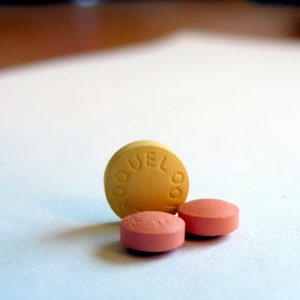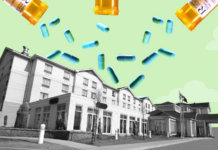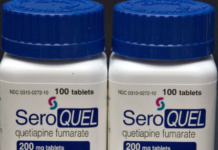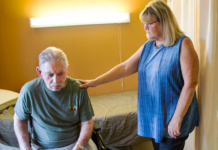A new study in JAMA Neurology finds that the use of antipsychotic drugs more than doubled the risk of death in patients with Parkinson’s disease. Use of antipsychotics is common in Parkinson’s patients who exhibit symptoms of dementia or psychosis, and the researchers call for increased caution when prescribing these drugs and for the development of non-drug approaches to managing psychiatric symptoms.
Since 2005, antipsychotic drugs have carried a black-box warning from the FDA indicating that increased mortality is associated with use for dementia and in the elderly. It is estimated that as many as sixty percent of Parkinson’s patients experience symptoms of psychosis and that up to eighty percent develop dementia over the long term. To use of antipsychotics to treat these symptoms is common, with one-third of all Parkinson’s patients receiving a prescription within seven years of diagnosis.
 Using data from the VA health system, researchers compared Parkinson’s patients who were prescribed antipsychotics with patients who did not use the drugs while controlling for potential confounding factors. They found that approximately 30% of these patients were prescribed a “high-potency” antipsychotic, which are likely to worsen the parkinsonism while also increasing mortality. These included risperidone, olanzapine, or haloperidol.
Using data from the VA health system, researchers compared Parkinson’s patients who were prescribed antipsychotics with patients who did not use the drugs while controlling for potential confounding factors. They found that approximately 30% of these patients were prescribed a “high-potency” antipsychotic, which are likely to worsen the parkinsonism while also increasing mortality. These included risperidone, olanzapine, or haloperidol.
Patients treated with antipsychotics were 38% more likely to have Parkinson’s disease listed as their cause of death. The researchers speculate that the antipsychotics may have worsened the underlying parkinsonism, leading to serious adverse events.
“Given the more than 2-fold increased mortality risk during six months of AP exposure and limited evidence of their efficacy, [antipsychotics] APs need to be used cautiously in patients with [parkinson’s] PD,” they write.
The researchers also conclude that using antipsychotics off-label for conditions that they are not approved to treat, like insomnia, should be discouraged.
*
Weintraub D, Chiang C, Kim H, et al. Association of Antipsychotic Use With Mortality Risk in Patients With Parkinson Disease. JAMA Neurol. Published online March 21, 2016. (Abstract)















Your next google search should be “psychiatric living will” and make sure to let it be known that you prefer they skip the nueroleptics if you exhibit symptoms of dementia or psychosis.
Attention doctors, if you torture me in my final days with nasty drugs, if its an option, I will come back and haunt you after I am dead if they allow those types of things in the after world.
Morphine as an Antipsychotic
Relevance of a 19th-Century Therapeutic Fashion
http://www.opioids.com/antipsychotic/index.html
Simple pain relievers a better alternative to antipsychotic medications for dementia patients
Many dementia patients are being treated with antipsychotic medications, but a new study shows that simple pain relievers may be a better alternative.
Nearly one in five patients in the study became significantly less agitated and aggressive after treatment with painkillers. The project is a collaborative effort between researchers in Norway and England.
Pain management for aggression and agitation
The study included 352 patients with moderate to serious dementia who exhibited significant behavioural problems such as aggression and agitation. During the eight-week study, all patients received their usual treatment, but half of them received pain treatment in addition.
Agitation is a common symptom of dementia; patients can become anxiety-ridden, upset and short-tempered. Many receive antipsychotic medications intended to reduce their behavioural disturbances, but antipsychotics have a powerful sedative effect and can even exacerbate other dementia symptoms and increase the risk of stroke.
Pain leads to aggressiveness
“The improvement the patients experienced was greater than would have been expected from treatment with antipsychotics,” says Bettina Husebø.
http://www.news-medical.net/news/20110908/Simple-pain-relievers-a-better-alternative-to-antipsychotic-medications-for-dementia-patients.aspx
You want Morphine not Haldol , what about addiction and the war on drugs ??? Put me in jail when I am dead see if I care.
Psychiatric living will, write one just in case.
Report comment
Morphine is worthless. When I was in the hospital with an ulcerative colitis flareup they kept giving me shot after shot after shot after shot of morphine and it didn’t do a damn thing. It dropped a 7 out of 10 pain down to about a 6.8 out of 10. It got to the point that if they were to continue having to use morphine, they’d have to put me in “twilight”, which adds a benzo and puts you on breathing support. I said no and demanded they give me something else. 1mg dilaudid every 4 hours from then on and I was practically floating through space and time.
Report comment
“1mg dilaudid every 4 hours from then on and I was practically floating through space and time.”
O.K., quite a bit of an exaggeration, but it dropped my pain down to about a 5, or significantly better than much higher doses of morphine did. My point was that morphine is really not that strong of an opiate drug anymore.
Report comment
OK then I will take floating through space and time all day on dilaudid instead of Anti psychotic Akathisia if I ever get senile dementia.
Morbid topic but a living will is important.
What do family and friends know when they hear from some doctor that we started your loved one on some Zyprexa or Risperdal for agitation ?
OK doc if you think it will “help” …
Report comment
You miss the point. It didn’t work for your pain. This is not about pain. It sure worked for mine.
The point is that antipsychotics worsen agitation and kill. Morphine calms and induces sleep.
Administering Haldol to anyone in distress or to anyone against their will should be a felony akin to attempted murder.
Report comment
“Morphine calms and induces sleep.”
Not necessarily. Many people experience agitation and anxiety from opiates. My father is one of those people and I am when it comes to certain ones, especially oxycontin. Much of if not virtually all of the people mixing opiates with benzos are doing it for this reason, since the two drugs do not have desirable effects that go good together (opiates can create a sense of euphoria and dream-like dissociation, benzos make you lethargic and create a sense of dysphoria and boredom)
Report comment
I’ve glanced at headlines and articles referring to the use of neuroleptics in parkinsons patients before and have never really been able to comprehend it. My brain just locks, it freezes. I’m struggling, to grasp the absurdity in using a drug that blocks/reduces dopamine in the brain in people whose disease causes its symptoms and suffering by doing the same thing.
I still cant grasp it. Neither have I ever been able to grasp the reality of how doctors use neuroleptic drugs in patients on mechanical ventilators and who have fevers or for whatever reason are “delirious”…
It just cant really be happening. Could any doctor, let alone thousands of doctors, really be that stupid and dangerously psychotic? And if so, why would it be allowed?
Report comment
There is no such thing as an antipsychotic. Psychotic is a subjective point of view of behaviour.
I agree with the other commenters who minds boggle at the use of poisons in people who are already sick.
Report comment
It hardly takes a Sherlock Holmes to see that using a depressant during a condition, where one’s CNS functioning is already depressed and becoming more so, is likely to have certain poor outcomes. The originators of this program should have simultaneously prepared frozen excuses they could quickly thaw and serve the public once their patients began to suddenly expire.
Report comment
This just happened to my mother in February at UCSD Health Center in San Diego. She went to ER with a minor scalp laceration from a fall and only because a naive, over-worrying sibling of mine insisted. She didn’t know her own birthday or what city she was in. Big deal. That wears off, and did wear off. Normally she is a sane, independent, clever and competent person who reads more in a month than most Americans read in a year.
They say she became “agitated” after some kind of dispute where she didn’t want the meal they brought her after putting 5 stitches in. Yeah, duh, major concussion with loss of consciousness. No reason to eat and plenty of reasons not to eat. They force-injected Haldol. Haloperidal prevents recovery from brain trauma. It’s sadistic.
After that they tortured her with a forced bladder catheter installation during which she screamed and yelled for help, she tells me, while a bunch of them held her down. There is no need for that. I call it rape. She was ambulatory and if she weren’t, there’s bedpans. No need.
She was there for two days and had no way to tell us she wanted to get the hell out of there. Nothing was done therapeutically, no CT-scan, no blood work, no neurologist. Just a captive.
This one brings me to tears – they put those mitt restraints on her hands at night. She tried to get them off, but you can’t. To think of my dignified, polite, kind, kind mother lying there with no one to help her just destroys me. She sacrificed most her adult life running a group that helped the local animal shelter by fostering dogs that would otherwise have been killed. Other women went shopping and went to martini lunched and spent weekends in Palm Springs while she was driving stray dogs to the vet and taking care of them as they recovered at her home. She was president of her class in nursing school in the 1950s.
This was UCSD Health Center in San Diego, which is hiding the worst record in the city in terms of percent of years during which they were fined for violations by the state department of public heath. In 2015 they got their sixth Immediate Jeopardy administrative penalty. The next highest was 3. They killed a woman who said she didn’t want to be discharged because she wasn’t breathing well, helping shove her into a cab. That failed so she was then carried face down by her feet and arms and left lying face down on the pavement. In another case in 2013, a 57 year old man with a head injury wandered out of the ward, out of the building and to the edge of the parking lot where he fell into a ravine. When they noticd he was missing, it took ten minutes to “reach security” during which no one actually looked for him, and 3 days to find his body at the bottom of the ravine. Video showed him leaving the building in a surgical gown, socks, and neck brace. This one is beyond imagination… http://bit.do/ucsd-abuse
I am out for blood, so to speak. Criminal charges. If anyone can recommend an advocacy group to guide me please respond here (if that’s allowed) or email a me at temporary, non-private email account I set up at MAILinator.com: [email protected]. (You can set one up too. Just make up a name and that’s it. Use immediately.)
For the love of all that’s holy, do not let an elder be in a hospital without anyone there. I thought my dad was on top of this but much to my grief, he was not. My mom says she will never be the same, and so far that looks to be the case. They killed her soul. Sorry about the histrionics, but they half-killed mine, too.
Report comment
I am so sorry for this horrible way they treated your mother. In the hospital my mother was in near NYC for heart attack, they gave all the older adults haldol every night “so they can sleep”. When we saw this, we intervened, but it was difficult to get it stopped since haldol was SOP for older adults. Horrifying things are happening routinely, can’t these nurses and others see what is going on? Actively hurting people and doing all for their own convenience (catheters and restraints). I am sickened. Yes, we need an advocate to survive a hospital stay now. Not to mention all the hospital-acquired infections.
Report comment
It is simple, really.
ANTI-PSYCHOTICS CAUSE DEATH!
They cause it in all people….they cause diabetes and a host of other illnesses, they shorten life expectancy and they make people truly ill. Plus, they don’t work for the indications for which they are approved.
Plus, they make people already struggling truly miserable.
Aged-care facilities use them so they can reduce staffing levels and increase profits. No other reason.
They are torture drugs and should be seen as such. That they are given to vulnerable human beings is criminal.
That the law can be abused to force people to use them or force them to be injected with them against their will is unconscionable.
Study after study shows their danger.
When will these substances be totally banned ?
Report comment
Haloperidol clearly is neurotoxic. Should it be banned?
Current Psychiatry 2013 July;12(7):7-8.
Henry A. Nasrallah, MD
Editor-in-Chief
“Few medications remain in use 50 years after they were launched. Advances in drug development often render older drugs obsolete because newer drugs are more efficacious or safer, or both. Consider reserpine: Nowadays, no internist would use this drug to treat hypertension, even though it was the top-selling antihypertensive 50 years ago. Why? The adverse effects profile is no longer acceptable, with safer alternatives available.”
(The author is actually a big fan of antipsychotics.)
http://www.currentpsychiatry.com/topics/schizophrenia-other-psychotic-disorders/article/haloperidol-clearly-is-neurotoxic-should-it-be-banned.html
Report comment
There is a subset of dementia patients that is know to react badly to antipsychotics. They are not easy to distinguish from Alzheimer’s patients. Their condition is called Dementia with Lewy Bodies, sometimes just DLB. They differ from AD patients in that they tend to have visual hallucinations and those tend to start in before memory loss or other features of AD begin. There is a range of estimates on host percents of dementia is DLB: 15% to 34%. They must never receive an antipsychotic. Hospitals should be required to exclude DLB patients from antipsychotic drugs, or risk killing them.
“Patients are particularly sensitive to developing extrapyramidal symptoms (EPS) and also to the potentially fatal complication of neuroleptic sensitivity, which affects approximately 50% of DLB patients”
From:
J Clin Psychiatry. 2004;65 Suppl 11:16-22.
Lewy body dementia: the litmus test for neuroleptic sensitivity and extrapyramidal symptoms.
Report comment
I forgot the relevant part. In Parkinsons’s dementia, Lewy bodies are involved.
I came across a study since I last posted that showed a caner drug with promise in treating
https://gumc.georgetown.edu/news/Cancer-Drug-Improved-Cognition-and-Motor-Skills-in-Small-Parkinsons-Clinical-Trial
“An FDA-approved drug for leukemia improved cognition, motor skills and non-motor function in patients with Parkinson’s disease and Lewy body dementia in a small phase I clinical trial, report researchers at Georgetown University Medical Center (GUMC) in Washington. In addition, the drug, nilotinib (Tasigna® by Novartis), led to statistically significant and encouraging changes in toxic proteins linked to disease progression (biomarkers).”
Report comment